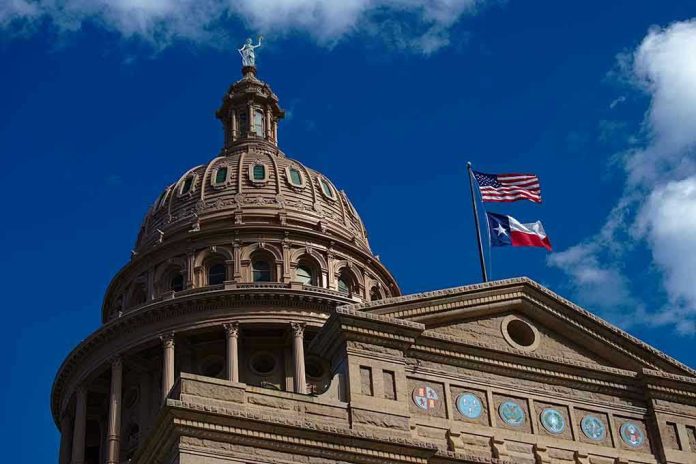
In a move that could shake the foundations of Texas politics and beyond, Texas Democrats are preparing to flee the state in a dramatic attempt to block a Republican redistricting plan, despite facing $500 daily fines and threats of arrest.
At a Glance
- Texas Democrats plan to break quorum to block GOP-led redistricting.
- Facing $500 daily fines and threats of arrest from Attorney General Ken Paxton.
- The GOP map aims to secure more Republican seats for 2026 elections.
- Democrats demand flood relief legislation before any redistricting vote.
Democrats Ready to Flee in Redistricting Standoff
Texas Democrats are once again gearing up for a dramatic political showdown by planning to leave the state to prevent a Republican-controlled legislature from passing a new congressional redistricting plan. This plan, heavily influenced by former President Donald Trump, seeks to solidify Republican power by securing additional seats ahead of the 2026 midterms. As if the political stakes weren’t high enough, Democrats now face the prospect of $500 daily fines for each day they are absent and the potential for arrest, thanks to Attorney General Ken Paxton.
Texas Democrats preparing state exodus to block GOP redistricting despite $500 daily fines https://t.co/Zxd8ZnFYSC
— Fox News (@FoxNews) July 30, 2025
This isn’t the first time Texas Democrats have used such tactics. Back in 2003 and again in 2021, they left the state to block GOP legislation. Now, they are facing even more formidable financial and legal pressures. But the Democrats are not backing down. They are demanding that flood relief legislation be prioritized before any discussions on redistricting, following deadly floods in Central Texas earlier this summer.
Quorum-Breaking: A High-Stakes Political Game
Breaking quorum is not just a political maneuver but a strategic play in the high-stakes game of legislative chess. The Texas House Democratic Caucus has been vocal about their willingness to take this extreme step if necessary. With the GOP map expected to be unveiled soon, featuring five new districts that Trump carried by double digits, the Democratic lawmakers are finalizing plans to leave the state as a last resort to block the redistricting.
Democrats argue that this move is essential to protect minority voting power and prevent what they see as GOP gerrymandering. The national implications of this standoff are significant, as the redistricting could influence control of the U.S. House in 2026. House Minority Leader Hakeem Jeffries has even visited Austin for strategic talks with Texas Democrats, signaling the national importance of this issue.
Financial and Legal Pressures Mount
Fines and legal threats have not deterred Democrats from their mission. They are actively fundraising to cover these financial penalties, with claims of having found legal alternatives to using campaign funds for fines. The GOP, meanwhile, argues that this is an abdication of legislative duty and a subversion of the democratic process. Speaker Dustin Burrows and Governor Greg Abbott, both Republicans, remain firmly in control of the legislative process, with Abbott having called the special session that is set to end on August 19, 2025.
The stakes are high not just for Texas, but for the entire nation. Texas is a critical battleground state, and control of its congressional seats could tilt the balance of power in the U.S. House in the upcoming elections. The Democrats’ tactic of breaking quorum is constitutionally permissible, though subject to state enforcement, and it remains to be seen how this political drama will unfold.
Implications for the Future
The outcome of this standoff will have significant implications, both in the short and long term. In the immediate future, a successful quorum break could lead to legislative paralysis in Texas, delaying or even derailing the GOP’s redistricting efforts. However, this could also result in arrests and fines for the absent Democrats. Long-term implications include potential court battles over the redistricting map and its impact on minority representation and overall control of the U.S. House in 2026.
As the political theater unfolds, the tension between Democrats and Republicans in Texas highlights the broader issues of minority rights, legislative norms, and the future of redistricting battles across the nation. With both sides digging in their heels, the coming weeks promise to be a critical period in shaping not just Texas politics, but the national landscape as well.









